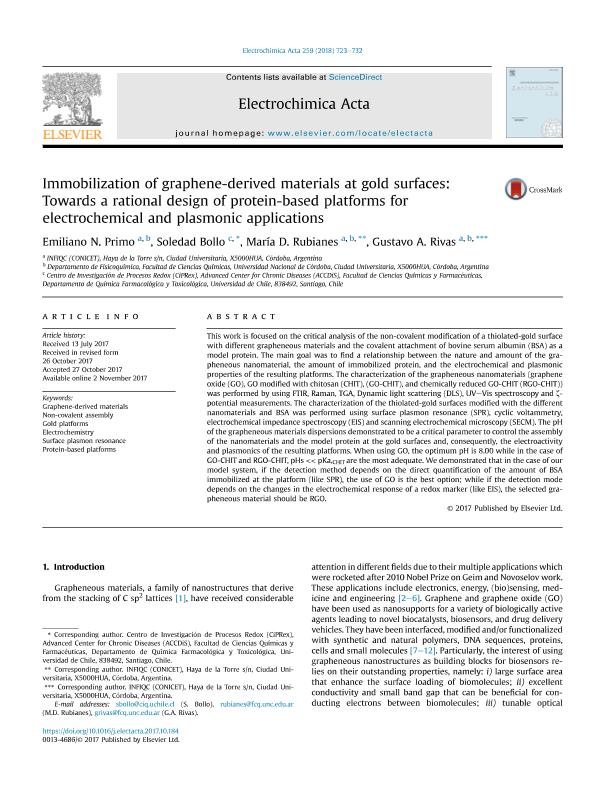Mostrar el registro sencillo del ítem
dc.contributor.author
Primo, Emiliano Nicolás

dc.contributor.author
Bollo, Soledad
dc.contributor.author
Rubianes, María Dolores

dc.contributor.author
Rivas, Gustavo Adolfo

dc.date.available
2019-10-09T13:41:19Z
dc.date.issued
2018-01
dc.identifier.citation
Primo, Emiliano Nicolás; Bollo, Soledad; Rubianes, María Dolores; Rivas, Gustavo Adolfo; Immobilization of graphene-derived materials at gold surfaces: Towards a rational design of protein-based platforms for electrochemical and plasmonic applications; Pergamon-Elsevier Science Ltd; Electrochimica Acta; 259; 1-2018; 723-732
dc.identifier.issn
0013-4686
dc.identifier.uri
http://hdl.handle.net/11336/85435
dc.description.abstract
This work is focused on the critical analysis of the non-covalent modification of a thiolated-gold surface with different grapheneous materials and the covalent attachment of bovine serum albumin (BSA) as a model protein. The main goal was to find a relationship between the nature and amount of the grapheneous nanomaterial, the amount of immobilized protein, and the electrochemical and plasmonic properties of the resulting platforms. The characterization of the grapheneous nanomaterials (graphene oxide (GO), GO modified with chitosan (CHIT), (GO-CHIT), and chemically reduced GO-CHIT (RGO-CHIT)) was performed by using FTIR, Raman, TGA, Dynamic light scattering (DLS), UV–Vis spectroscopy and ζ-potential measurements. The characterization of the thiolated-gold surfaces modified with the different nanomaterials and BSA was performed using surface plasmon resonance (SPR), cyclic voltammetry, electrochemical impedance spectroscopy (EIS) and scanning electrochemical microscopy (SECM). The pH of the grapheneous materials dispersions demonstrated to be a critical parameter to control the assembly of the nanomaterials and the model protein at the gold surfaces and, consequently, the electroactivity and plasmonics of the resulting platforms. When using GO, the optimum pH is 8.00 while in the case of GO-CHIT and RGO-CHIT, pHs << pKa,CHIT are the most adequate. We demonstrated that in the case of our model system, if the detection method depends on the direct quantification of the amount of BSA immobilized at the platform (like SPR), the use of GO is the best option; while if the detection mode depends on the changes in the electrochemical response of a redox marker (like EIS), the selected grapheneous material should be RGO.
dc.format
application/pdf
dc.language.iso
eng
dc.publisher
Pergamon-Elsevier Science Ltd

dc.rights
info:eu-repo/semantics/openAccess
dc.rights.uri
https://creativecommons.org/licenses/by-nc-sa/2.5/ar/
dc.subject
ELECTROCHEMISTRY
dc.subject
GOLD PLATFORMS
dc.subject
GRAPHENE-DERIVED MATERIALS
dc.subject
NON-COVALENT ASSEMBLY
dc.subject
PROTEIN-BASED PLATFORMS
dc.subject
SURFACE PLASMON RESONANCE
dc.subject.classification
Química Analítica

dc.subject.classification
Ciencias Químicas

dc.subject.classification
CIENCIAS NATURALES Y EXACTAS

dc.title
Immobilization of graphene-derived materials at gold surfaces: Towards a rational design of protein-based platforms for electrochemical and plasmonic applications
dc.type
info:eu-repo/semantics/article
dc.type
info:ar-repo/semantics/artículo
dc.type
info:eu-repo/semantics/publishedVersion
dc.date.updated
2019-09-30T18:31:17Z
dc.journal.volume
259
dc.journal.pagination
723-732
dc.journal.pais
Estados Unidos

dc.description.fil
Fil: Primo, Emiliano Nicolás. Consejo Nacional de Investigaciones Científicas y Técnicas. Centro Científico Tecnológico Conicet - Córdoba. Instituto de Investigaciones en Físico-química de Córdoba. Universidad Nacional de Córdoba. Facultad de Ciencias Químicas. Instituto de Investigaciones en Físico-química de Córdoba; Argentina
dc.description.fil
Fil: Bollo, Soledad. Universidad de Chile; Chile
dc.description.fil
Fil: Rubianes, María Dolores. Consejo Nacional de Investigaciones Científicas y Técnicas. Centro Científico Tecnológico Conicet - Córdoba. Instituto de Investigaciones en Físico-química de Córdoba. Universidad Nacional de Córdoba. Facultad de Ciencias Químicas. Instituto de Investigaciones en Físico-química de Córdoba; Argentina
dc.description.fil
Fil: Rivas, Gustavo Adolfo. Consejo Nacional de Investigaciones Científicas y Técnicas. Centro Científico Tecnológico Conicet - Córdoba. Instituto de Investigaciones en Físico-química de Córdoba. Universidad Nacional de Córdoba. Facultad de Ciencias Químicas. Instituto de Investigaciones en Físico-química de Córdoba; Argentina
dc.journal.title
Electrochimica Acta

dc.relation.alternativeid
info:eu-repo/semantics/altIdentifier/doi/https://doi.org/10.1016/j.electacta.2017.10.184
dc.relation.alternativeid
info:eu-repo/semantics/altIdentifier/url/https://www.sciencedirect.com/science/article/pii/S0013468617323307
Archivos asociados
